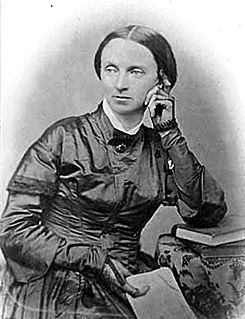A Quote by Jane Swisshelm
A woman with her two children was captured on the steps of the capitol building, whither she had fled for protection, and this, too, while the stars and stripes floated over it.
Related Quotes
The extraordinary woman depends on the ordinary woman. It is only when we know what were the conditions of the average woman's life - the number of children, whether she had money of her own, if she had a room to herself, whether she had help bringing up her family, if she had servants, whether part of the housework was her task - it is only when we can measure the way of life and experience made possible to the ordinary woman that we can account for the success or failure of the extraordinary woman as a writer.
What is a woman's power then?" she asked. "I don't think we know." "When has a woman power because she's a woman? With her children, I suppose. For a while..." "In her house, maybe." She looked around the kitchen. "But the doors are shut," she said, "the doors are locked." "Because you're valuable." "Oh yes. We're precious. So long as we're powerless.
I recall an August afternoon in Chicago in 1973 when I took my daughter, then seven, to see what Georgia O’Keeffe had done with where she had been. One of the vast O’Keeffe ‘Sky Above Clouds’ canvases floated over the back stairs in the Chicago Art Institute that day, dominating what seemed to be several stories of empty light, and my daughter looked at it once, ran to the landing, and kept on looking. "Who drew it," she whispered after a while. I told her. "I need to talk to her," she said finally.
[My mother] was the oldest of two sisters and two brothers, and she grew up with her brothers, who were about her age. She grew up, to the age of ten, like a wild colt, and then all of a sudden that was over. They had forced on her her 'woman's destiny' by saying, 'This isn't done, this isn't good, this isn't worthy of a lady.'
A woman will test you to see if you are what you say you are. Any woman that you fall in love with: She loves you too, but she's going to try you; that's her nature. She has to know that she can depend on you; she has to know that you will stand up for her. She has to know that you will back up the children that she brings in the world for us.
Nora leaves her husband, not-as the stupid critic would have it-because she is tired of her responsibilities or feels the need of woman's rights, but because she has come to know that for eight years she had lived with a stranger and borne him children. Can there be anything more humiliating, more degrading than a life-long proximity between two strangers? No need for the woman to know anything of the man, save his income. As to the knowledge of the woman-what is there to know except that she has a pleasing appearance?
That stirring which had fluttered in her on first glimpsing the sea—that stirring landlocked children know so well—moved in her now, with the golden stars over head, and the green fireflies glinting on the wooded shore. She carefully unfolded the stirring that she had so tightly packed away. It billowed out like a sail, and she laughed, despite herself, despite hunger and hard things ahead.
My mother could never have said she loved fall, but as she walked down the steps with her suitcase in hand toward the red Monte Carlo her husband had been waiting in for nearly an hour, she could have said that she respected its place as a mediator between two extremes. Fall came and went, while winter was endured and summer was revered. Fall was the repose that made both possible and bearable, and now here she was was with her husband next to her, heading headlong into an early-fall afternoon with only the vaguest ideas of who they were becoming and what came next.
As one woman told me, "When I decided to come in to work happy, everybody around me became happy." This woman had decided to quit a job she hated, and on the last day of her two weeks' notice, she woke up happy. At the end of the day, she noticed that everybody around her was happy, too- so she didn't quit after all. She decided to come to work happy instead. Two years later, she's still on the job, radiating happiness and love.
From an early age she had developed the art of being alone and generally preferred her own company to anyone else’s. She read books at enormous speed and judged them entirely on her ability to remove her from her material surroundings. In almost all the unhappiest days of her life she had been able to escape from her own inner world by living temporarily in someone else’s, and on the two or three occasions that she had been too upset to concentrate she had been desolate.
it is my lady! *sighs* o, it is my love! o, that she knew she were! she speaks, yet she sais nothing. what of that? her eye discourses; i will answer it. i am too bold, 'tis not to me she speaks; two of the fairest stars in all the heaven, having some business, do entreat her eyes to twinkle in their spheres till they return.
He destroyed in her the knowing, doubting, sophisticated Ella, and again and again he put her intelligence to sleep, and with her willing connivance, so that she floated darkly on her love for him, on her naivety, which is another word for a spontaneous creative faith. And when his own distrust of himself destroyed this woman-in-love, so that she began thinking, she would fight to return to naivety.

































